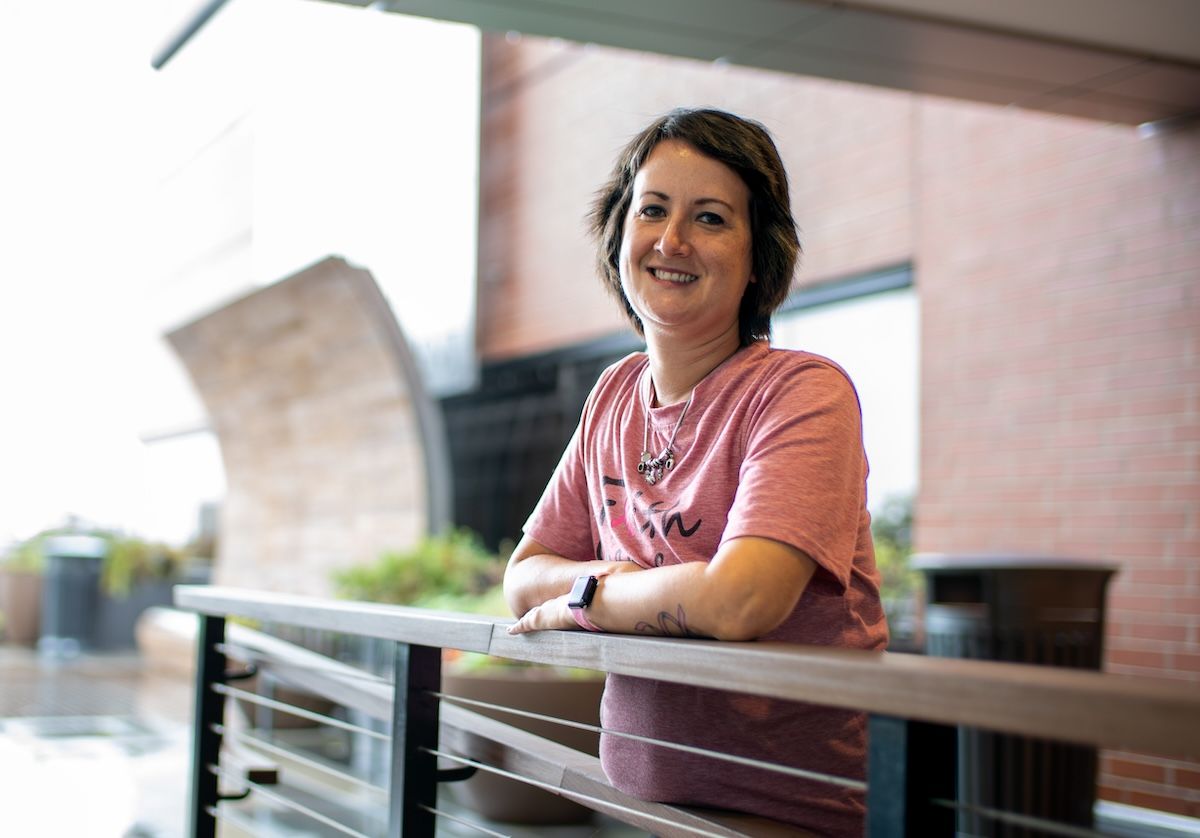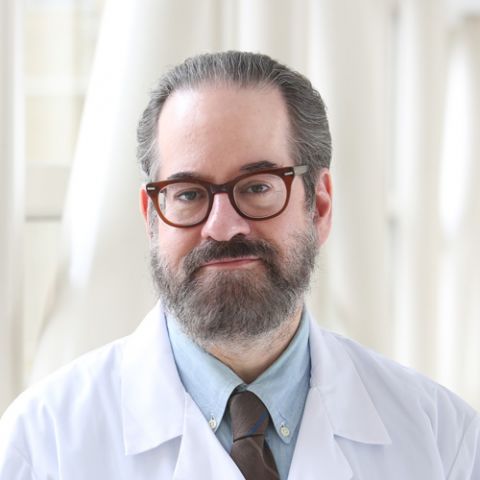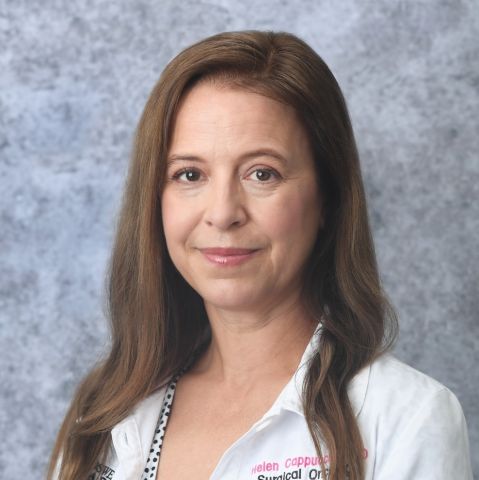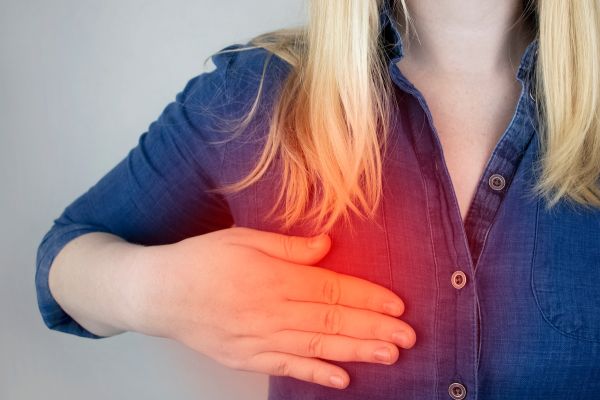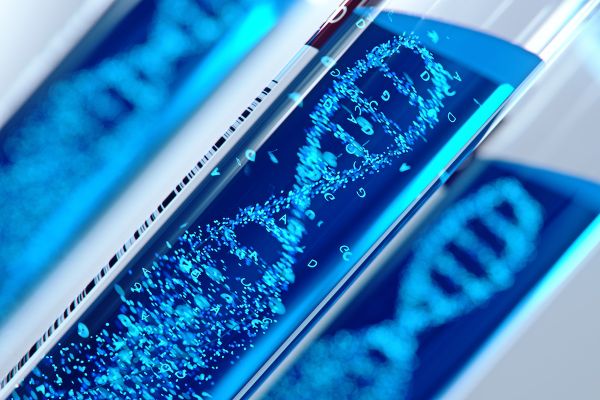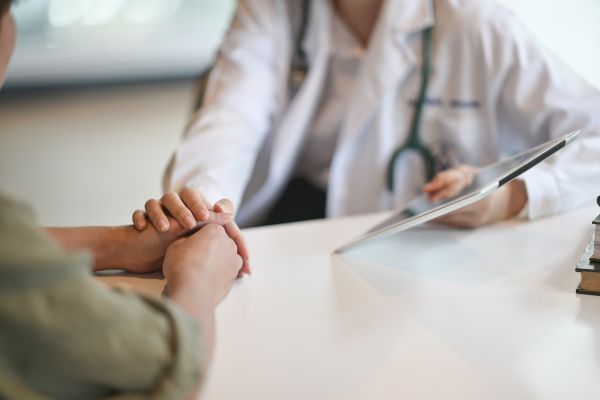On her Facebook page, Jennifer Makin has a picture of a pink breast cancer ribbon next to a quote by well-being educator Nakeia Homer that reads “Behind every strong woman is a story that gave her no other choice.” And while it is true that Jennifer, age 38, would never have chosen a triple-positive breast cancer diagnosis, she learned that she did indeed have strength — and choices. Ultimately, those choices led her to transfer her treatment to Roswell Park Comprehensive Cancer Center “and I don’t regret it for a second,” she says.
A missed diagnosis
In 2017, three years after she stopped breast-feeding her second child, Jennifer felt a painful lump and clear fluid leaking from the nipple of her left breast – which can be symptoms of both breast cancer and mastitis, an infection. “I went to my gynecologist for an exam and culture sample of the leaking fluid and was diagnosed with an infected breast abscess,” Jennifer recalls. “The infection went away with antibiotics, but soon after, I felt the lump again and my nipple became inverted – again, both possible symptoms of breast cancer. I went to a local radiology facility for a mammogram and ultrasound and was told that the nipple inversion and lump were caused by scar tissue from my abscess, and unless I noticed any drastic changes, I should not be concerned, but should continue having mammograms and ultrasounds every six months.” Jennifer faithfully returned to the same facility for three years, and at her appointment in 2021, was told she didn’t need to come back for another three years.
But what she wasn’t ever told — and later learned — was that for all four years, her radiologist had noted the mass was suspicious and, at her last two mammograms, he also noted an enlarged node that needed to be monitored, yet there was never any biopsy performed.
One year later, Jennifer still felt something wasn’t right with her breast. “I told my gynecologist, and, thankfully, he took my concerns seriously and sent me to the same facility for another mammogram, ultrasound and, finally, a biopsy. This time a different radiologist called me two days later and told me he’d found evidence of triple-positive cancer in my left breast and in two of my lymph nodes.” Triple-positive breast cancer means that the cancer cells have three specific proteins that cause breast cells to multiply too quickly — estrogen receptors, progesterone receptors and high levels of human epidermal growth factor receptor 2 (HER2).
Jennifer was referred to a local breast oncologist who told her she had stage 2A breast cancer and ordered a PET scan to determine if there was any distant spread. “After the PET scan, I heard nothing back at all — no results, not even a return phone call from the doctor’s office — even with me calling them every day for a week. And that’s when I decided to contact Roswell Park,” Jennifer says.
The Roswell Park difference
“As soon as I called Roswell Park and explained my situation, I immediately felt like I was more than just a number,” Jennifer recalls. “Right away, I was connected to the breast clinic and an appointment was set up. They made all the arrangements to get my records and imaging from the other facilities I’d been to and before my appointment, a team of Roswell Park specialists in breast radiology, pathology, medical oncology and surgical oncology reviewed my records and collectively devised a treatment plan for me."
Within days, Jennifer and her husband Tom met with Roswell Park surgical oncologist Helen Cappuccino, MD. "I learned I had affected lymph nodes in four different levels; three more levels than I was originally told, making my official staging 3A. Dr. Cappuccino explained what steps I should take next, and made an appointment for me with Roswell Park medical oncologist Ellis Levine, MD, for the following week.”
Dr. Levine explained a recommended and aggressive course of treatment: six cycles of chemotherapy over 18 weeks to shrink the tumors, followed by surgery to remove all tumors and affected lymph nodes, a month of radiation, and then, based on her response to the initial treatments, 14 cycles of a different chemotherapy combination aimed at the HER2 receptors on the cells, followed by endocrine therapy, to suppress the estrogen and progesterone, produced by the ovaries, that fuel the cancer’s growth.
It's never too late for a second opinion
You owe it to yourself to ensure your diagnosis and treatment plan is the right one for you.
Making her own choices
“Dr. Levine gave Tom and I time to digest and discuss this information, ask questions and make choices about my treatment,” Jennifer recalls. “Since I was 37 and we already have two children, we decided not to pursue fertility-sparing options. I also chose to have both of my breasts removed after chemotherapy, with no reconstruction. I decided to pursue genetic testing, to help inform my treatment and also to give my children and family a better understanding of our family’s health history. Another advantage was that all of these services, and more, were offered at Roswell Park’s main campus, 20 minutes from my home, so we didn’t have to travel to several different facilities all over Western New York.”
In late June, about two weeks after her initial appointment at Roswell Park, Jennifer’s port was implanted and she started chemotherapy the following week. When her hair started falling out, she decided to skip the wig and “rock the bald look,” she says. “The kids helped shave my head and we talked to them about changes they would see in me and encouraged them to ask questions. We tried to keep things as normal as possible, like camping trips and holiday celebrations. At Halloween, we dressed up as fast food French fries, and the kids had me wear a red beanie to look like ketchup on my bald head,” Jennifer laughs.
While Jennifer learned she tested negative for the BRCA breast cancer-related gene, other family diagnoses occurred. “My mother was diagnosed with stage 4 breast cancer and I learned that my cousin and aunt on my dad’s side had also had breast cancer. As a result, my sisters, ages 35 and 33, have begun regular screening and exams as part of Roswell Park’s High Risk Breast Cancer Program and my daughter will begin early screening when she is older.”
After several months, Jennifer’s tumor had shrunk from 5 centimeters (cm) to just 1.5 cm, and residual cancer cells remained in only two of her lymph nodes. The next step was a double mastectomy by Dr. Cappuccino. The procedure went well, and Jennifer needed only Tylenol for pain relief afterwards, but there was one surprise. “The day of surgery, a blizzard hit Buffalo and the roads were closed, so I was driven home the next day via snowmobile, thanks to my husband and family members who are in law enforcement. On the upside, I can say that I love not having to wear a bra anymore,” Jennifer laughs.
Dealing with the emotions of treatment
The months following her mastectomy were a roller coaster of emotions for Jennifer. Her mother passed away 13 days before Christmas and, just after the holiday, Jennifer learned her latest PET scan was clear. She then started additional treatments: 35 days of radiation therapy, under the direction of Roswell Park radiation oncologist Simon Fung-Kee-Fung, MD (who Jennifer calls “amazing”), followed by chemotherapy with drugs that target HER2+ proteins and prevents them from stimulating cancer cell growth.
Additionally, because triple-positive breast cancer is fueled by estrogen and progesterone, Jennifer began receiving injections of an ovary suppressing drug, which caused early menopause. After more than a year of treatment, Jennifer’s port was removed. “It was exciting, but also terrifying. For 18 months, I had all these drugs and treatments working to kill cancer cells. But now, it’s up to my body, which has already failed me, to do this on its own. The fear of recurrence is real, and I am grateful I got help from Roswell Park’s counseling center to help me deal with my anxiety,” Jennifer says.
The next chapter
As she moves forward, Jennifer has started working out again and signed up for dance lessons after taking a year off for her treatment. She also accepted a part-time job as a customer care representative in Roswell Park’s phlebotomy department, and often sees patients she met in the breast clinic or during chemotherapy. “I want to help people navigate their own cancer journey," Jennifer says. “I tell people all the time that if you feel that something is wrong, you owe it to yourself to not have it dismissed and to get it checked out, regardless of your age. I want to inspire people to say, ‘because of you, I didn’t give up.’ And I want people at Roswell Park to know they are in amazing hands here. I’m so proud to be part of this team of caring, compassionate people.”
Schedule your mammogram today
It matters where you get your mammogram, and it matters who reads your mammogram.
Editor’s Note: Cancer patient outcomes and experiences may vary, even for those with the same type of cancer. An individual patient’s story should not be used as a prediction of how another patient will respond to treatment. Roswell Park is transparent about the survival rates of our patients as compared to national standards, and provides this information, when available, within the cancer type sections of this website.
